|
Getting diagnosed with Hemophilia wasn’t easy for Larry. He was told he wouldn’t live long and this crushed him, as it does so many others. Because of this, he didn’t really focus much on his future. Larry just lived life with no fear and not many goals for himself. The neighborhood Larry grew up in was not a very good neighborhood and he eventually became a product of his environment. With not much hope of living a long life he found happiness in using and selling drugs. He lived on the streets, constantly getting into fights over drugs and other things. This all came to a stop when he was arrested and sent to prison at the age of 22. Larry spent seven years in prison. During this time, he realized that his hemophilia, in fact, wasn’t going to kill him. Larry decided, then, he wanted to change his life and become a better person. He went to college to get a degree. With his new outlook on life, and getting a degree, Larry was still told that he would never be anything. He couldn’t do anything with this degree and no one would hire him because of his hemophilia. This returned him to the hopelessness that engulfed him growing up with Hemophilia. He went back into his old ways and ended up back in the criminal justice system. Larry got lucky this time around and beat his case in court and avoided going back to prison. After this Larry decided to move back to Michigan to be with his dad. He needed to get away from his past to be able to have a new start at life. Over the next year, Larry self-isolated, self-medicated and began drinking heavily. He was barely getting by, even though he had a job doing Upholstery. He wasn't happy. The upholstery business became too much for him physically and he decided to go back to school. He knew there had to be something better for him. Larry gives credit to HFA and the social worker at his local HTC for the motivation to change his life and become a better, happier person. In the past year, a lot has changed for him. He got married, moved, started Hemlibra and now has two jobs doing what he loves.
During the day Larry is a recovery coach at a local recovery institution. He specializes in peer support. At night, he is on call for the opiate overdose response program. This means when someone with a substance abuse problem goes to the ER because of an overdose or it's recognized that they have a substance abuse problem. They are offered the opportunity to speak with someone who has lived through this and has knowledge of resources, also known as a recovery coach. If the patient is interested, Larry is called to the ER to help with the situation. Larry, also, volunteers for HFA on the advocacy leader council (ALC). This volunteer position is a two year commitment and there are only 12 people on the council with 2 advocacy leaders in Michigan. This year his independent project as part HFA's ALC, is focusing on mental health. Larry and the other advocacy leaders have to observe what’s happening within the community and pick an existing legislative issue, or one, that hasn’t yet been addressed. Then they develop a plan to either address or advocate for the issue. Larry has also been part of a working with HFM as part of a working group that is developing a series of mental health talks to be presented by HFM. Another huge change in Larry’s life this past year was switching to Hemlibra. He is very impressed by this medication. He’s gone a year with no bleeds and it's liberated him. This is a major lifestyle change, because he used to be in constant pain from bleeds and damage to his joints. He says Hemilibra has drastically reduced his chronic pain and now he only contends with the pain from the arthritis in his joints that has resulted from a lifetime of bleeds Larry was so happy to find and marry the love of his life this past September. He gives her a lot of credit for constantly encouraging him and being such a strong support system for him. Aside from his marriage, the advancement in his career has been the biggest highlight of his life. He is finally financially stable and for the first time ever, he was able to buy himself a brand new car. Larry says, “I still find myself driving down the road and thinking WOW, this is really mine.” Larry said, “it’s not about having big groups of people, it’s about reaching out to those who don’t know we're here.” This is what continues to give him motivation. Reaching out to those who don’t have support and don’t know there is even this kind of support available is one of his missions in life. For about a year prior to launching his Hope Group in Kalamazoo, Larry was already meeting with a group of local hemophiliacs. When asked what Larry would tell people to help encourage them he said, “There’s always a way, there is always someone to help. You can’t do life alone, you need support. Reach out to your community, reach out for help.” |
Hope Charities
|
Live Chat Support
×
Connecting

You:
::content::
::agent_name::
::content::
::content::
::content::

 RSS Feed
RSS Feed